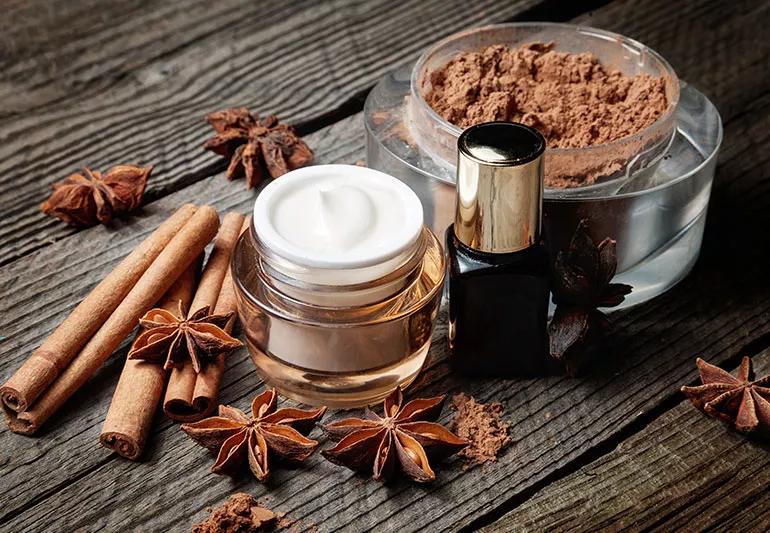How your morning pick-me-up can perk up your skin, too

When you need a morning jolt, a cup of joe typically does the trick. Can applying caffeinated creams and serums do the same for sleepy skin?
Advertisement
Cleveland Clinic is a non-profit academic medical center. Advertising on our site helps support our mission. We do not endorse non-Cleveland Clinic products or services. Policy
Aesthetician Lori Scarso explains why beauty enthusiasts are abuzz about skin care products featuring caffeine and outlines what exactly they can (and can’t) do for your skin.
Caffeine has become a popular ingredient in skin care products ranging from under-eye serums to face masks to anti-cellulite creams and beyond. While marketing claims it can “wake up” your skin, here’s what that really means.
Caffeine is an antioxidant, which is known to protect skin from damage caused by free radicals — molecules that break down your collagen and cause fine lines, wrinkles and otherwise saggy, sallow skin.
“Antioxidants are huge in skin care right now,” Scarso says. “You get free radical damage from UV rays and toxins in the environment, but applying antioxidants is good for your skin because it can help stop some of that damage.”
Caffeine is a vasoconstrictor, which means it makes the blood vessels constrict, or tighten. That, in turn, reduces blood flow to the skin and makes your skin look brighter and smoother — like a real-life Instagram filter for your face!
Wake up with a huge hangover? Just didn’t get enough sleep last night? A caffeinated product may be just the trick to reduce the appearance of those dark circles and under-eye bags that come with general exhaustion.
Advertisement
That’s because it can help with microcirculation, which constricts the blood vessels and helps temporarily reduce discoloration in the skin. Say buh-bye — at least in the short-term — to those dark circles under your eyes. (A warning, though: “If you have under-eye bags due to genetics, caffeine is not going to help,” Scarso says.)
When applied to the skin, caffeine’s anti-inflammatory properties help reduce redness and soothe skin inflamed by sun exposure (but try not to subject yourself to sun damage to begin with!)
Caffeinated creams become particularly popular in the summer, Scarso says, when people are preparing to bare it at the beach. That’s because they can be a quick fix to temporarily lessen the appearance of skin dimpled with cellulite and streaked with stretch marks.
“Caffeine is known to stimulate enzymes that break down fats, so it can temporarily dehydrate fat cells,” Scarso explains. “That results in a smoother and more firm appearance for a little while.”
When using cellulite creams or stretch mark reduction products, the best way to apply them is to massage them into your skin. The massaging motion teams up with the caffeine itself to help stimulate those enzymes.
Just like a cup of coffee only keeps you perked up for a few hours, so too do topical caffeinated products only provide benefits for a little while. That means they don’t cure wrinkles, fine lines, under-eye bags and puffiness — just temporarily change their appearance.
If you’re a Harry Potter fan, think of it as a Polyjuice potion for pores: As soon as the product wears off, your face returns to its standard state. “It might change the appearance of your skin in the moment, while you’re using it, but it’s not a treatment,” Scarso says.
Caffeinated skin care products are typically safe to use at any time, though if you’re using them for temporary tightening, brightening and the like, it’s best to use them in the morning because remember: As the product wears off, so too will its benefits.
Advertisement

Sign up for our Health Essentials emails for expert guidance on nutrition, fitness, sleep, skin care and more.
Learn more about our editorial process.
Advertisement

Although it could be used as a moisturizer, this new trend is not recommended

It’s a great disinfectant for around your home, but not for your skin

Changes in texture, smell, color and performance are signs it’s time to throw the cosmetic item away

Strengthening your skin barrier, simple routines and minimizing products are ongoing, popular trends

Moisturizing, running a humidifier and adjusting your showers may help keep itchiness and irritation at bay

Glycolic acid benefits skin tone, texture and pigmentation by exfoliating dead skin

Some gentle soap and warm water go a long way when you’re washing these cosmetic tools regularly

New formulas are less drying and contain water-based and skin-loving ingredients

Even small moments of time outdoors can help reduce stress, boost mood and restore a sense of calm

A correct prescription helps your eyes see clearly — but as natural changes occur, you may need stronger or different eyeglasses

Both are medical emergencies, but they are very distinct events with different causes